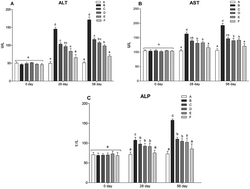Bok-choy promotes growth performance, lipid metabolism and related gene expression in Syrian golden hamsters fed with a high-fat diet
Abstract
Broadly, bok-choy is known for its potential benefits as part of a human diet. However, the effects and deeper investigations of bok-choy on human health are still insufficient. This study aimed to investigate the beneficial effects of two cultivars of bok-choy, ‘Suzhouqing’ (green cultivar) and ‘Ziluolan’ (purple cultivar), on growth performance, lipid metabolism and related gene expressions in Syrian golden hamsters. Fifty six male Syrian golden hamsters (6-months-old) were randomly assigned into 6 groups: normal diet (A), high-fat diet (B), high-fat diet + 5% ‘Suzhouqing’ (C), high-fat diet + 7% ‘Suzhouqing’ (D), high-fat diet + 5% ‘Ziluolan’ (E), and high-fat diet + 7% ‘Ziluolan’ (F), fed for 56 consecutive days. On day 0, 28 and 56, blood and liver samples were collected to examine the lipid profile, liver enzymes, histomorphology and related gene expressions. The results showed that group B had significantly increased levels of total cholesterol, triglycerides, low-density lipoprotein cholesterol, alanine aminotransferase, aspartate aminotransferase and alkaline phosphatase, while (P < 0.05) showed impaired levels of high-density lipoprotein cholesterol compared with group A. Group D, E and F had significantly reduced levels of total cholesterol, triglycerides, low-density lipoprotein cholesterol, alanine aminotransferase, aspartate aminotransferase and alkaline phosphatase, while the level of high-density lipoprotein cholesterol was significantly increased compared with group B. Remarkably, the mRNA expressions of CEBP-α, DGAT1, lipoprotein lipase (LPL), FASN and 3-hydroxy-3-methylglutaryl-CoA reductase (HMG-CoA) were significantly up-regulated and carnitine palmitoyl transferase 2 (CPT2), Cyp27A1 and proliferator activated receptor alpha (PPAR-α) were significantly down-regulated in group B compared with group A. However, in group D, E and F, the mRNA expression levels of CCAAT enhancer binding protein alpha, DGAT1, LPL, FASN and HMG-CoA were significantly down-regulated and CPT2, Cyp27A1 and PPAR-α were significantly up-regulated compared with group B. In conclusion, different amounts of bok-choy added to the diets incredibly improved the lipid-profile, enhanced liver enzyme activities and related gene expression. The hamsters supplemented with 7% ‘Ziluolan’ exhibited the best performance among all the other high-fat groups, which shows that Ziluolan could be a great alternative for the reduction of fat accumulation and conserving health.



 Please wait while we load your content...
Please wait while we load your content...